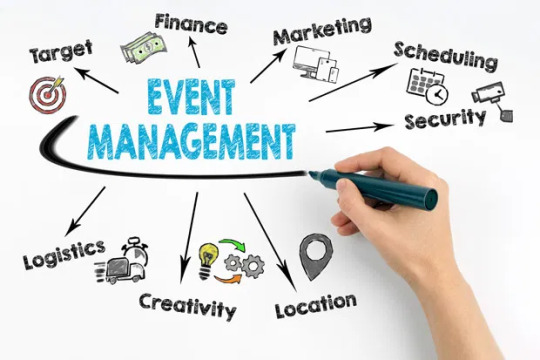Hi, I am a college student with event management as elective.
Don't wanna be here? Send us removal request.
Text
Decorations for Wedding
Hello everyone. This is the first blog of a new series that I posted about earlier.
FLORAL DECOR




BALLOON DECOR


* all images are taken from GOOGLE.
1 note
·
View note
Text
Hi everyone, since I write blogs related to event management and event planning, I thought to start a series where I would publish certain blogs featuring best decorations according to different occasions, that may include wedding, birthday, conferences, seminars, fairs, etc. Hope y’all will like it and do share if you do. Stay tuned for more upcoming blogs.
1 note
·
View note
Text
TYPES OF EVENTS

Event management is a vast industry, be it any country. An event can be described as a public assembly for celebration, education, marketing, or reunion. Events can be classified based on their size, type, and context.
According to me, events can be classified into 5 major categories, namely:
CORPORATE EVENTS
FESTIVALS
VIRTUAL EVENTS
FUNDRAISING EVENTS
SOCIAL EVENTS
Let’s know about the further classifications of each one of them.
CORPORATE EVENTS
Seminars - Seminars are the most common type of corporate event. A seminar is organized with a particular target public in mind and aims to communicate highly pertinent information. This type of event can be held at a community location, your company headquarters, or even online via a platform like a Zoom meeting or Google Meet.
Conferences - Conferences are much more complex events to embolden conversations and offer people a platform to share their expertise. Conferences are one of the most fruitful types of business networking events, usually beginning with a keynote session before moving to interviews, roundtables, and panel discussions.
Trade Shows - Trade shows offer a chance to display your latest product and introduce your brand to other businesses or the general public. As the focus is on displaying or exhibiting products, trade shows usually take place in spacious venues with room for lots of vendors. As a result, they present a great opportunity to generate sales leads.
FESTIVALS
Music Festivals - To host a successful music festival, it’s best to curate acts in related genres, as this helps you to narrow down your audience and target them appropriately. Though in-person music events require big space and a hefty budget.
Food Festivals - Food festivals involve a combination of food trucks, live demonstrations, and tents selling foodie goodies like innovative ingredients or the latest kitchen tools. They’re often focused on a certain theme, such as vegan food or international cuisine, and are a great way to bring a local community together.
Festival fairs - Many event planners organize fairs based on certain festivals. For instance, in India, you may have seen or heard about Diwali Mela, or Teej Fair, etc. Internationally, festival fairs may include the 4th July fair or New Year Event. These types of events include stalls of small businesses and food counters.
VIRTUAL EVENTS
Webinars - Webinar is an online version of the seminar. Both are similar types of events. The only difference is that a webinar is held virtually like on Zoom App or Google Meet app. Some company’s also own a YouTube channel, so for a large audience, the webinar is conducted over YouTube Live Streaming. A webinar involves an online presentation to a virtual audience around a specific topic, whether it be academic, like a historical event, or business-focused, like a sales masterclass.
Interactive Performances - Enterprising performers have found new ways to hold plays and other performances live. Stand-up comedy gigs can be hosted online, with people paying extra for a VIP ticket which allows them access to the virtual audience (and the opportunity to be “picked on” by the host) while everyone else watches in safety from a Livestream.
Summits - This collaborative event type is similar to an in-person conference, except it takes place virtually. Tickets give the attendees access to numerous talks, interviews, and presentations, all following a similar theme.
FUNDRAISING EVENTS
Auctions - An auction is usually a process of buying and selling goods or services by offering them up for bid, taking bids, and then selling the item to the highest bidder or buying the item from the lowest bidder.
Gala Dinners - These often glamorous events usually feature a fancy meal along with entertainment. Attendees pay for a seat at a table and, once they arrive, are encouraged to give generously via an auction, raffle, or competition. For these events, it’s often worth asking suppliers to become sponsors by reducing or waiving their fees in exchange for the opportunity to align themselves with a good cause.
SOCIAL EVENTS
Reunions - From a get-together with old classmates to an event that marks an important anniversary, reunions are often highly personal occasions. Speeches, a DJ playing songs everyone used to dance to, a slideshow of old photos – essentially, the event should help people reminisce. Hiring a photographer and videographer will help to record the new memories being made. And if invitees are living in destinations across the world, making your reunion a virtual one will give everyone the opportunity to attend.
Themed parties - A great event creator will always find an excuse to celebrate, and hosting a themed party can really help when it comes to making decisions around marketing, decorating, and catering.
Weddings/engagements/Birthdays/Anniversaries - These are the most common social events. And, I think the name is kind of self-explanatory.
Hope it was helpful!
1 note
·
View note
Text
Event Management 101

Event management is an application of project management to the production and development of small and/or large-scale personal or corporate events such as festivals, conferences, commemorations, weddings, formal parties, concerts, or conventions. It involves studying the brand, identifying its target audience, devising the event concept, and coordinating the technical aspects before actually launching the event.
This industry now includes events of all sizes from the Olympics down to business breakfast meetings. Many industries, celebrities, charitable organizations, and interest groups hold events to market their label, build business relationships, raise money, or celebrate their achievement.
The process of planning and coordinating the event is usually referred to as event planning and which can include budgeting, scheduling, site selection, acquiring necessary permits, coordinating transportation and parking, arranging for speakers or entertainers, arranging decor, event security, catering, coordinating with third-party vendors, and emergency plans. Each event is different so the process of planning & execution of each event differs based on the type of event.
To carry out a successful event, we must focus on the planning stage, this is the most important stage to achieve the proposed objectives. It is very necessary to visualize what we want to achieve, without this we will not be able to measure the results and verify that the proposed objective was achieved.
No matter what type of event we are organizing, or what way we are going to reach our audience, planning is the only guarantee of success.
2 notes
·
View notes